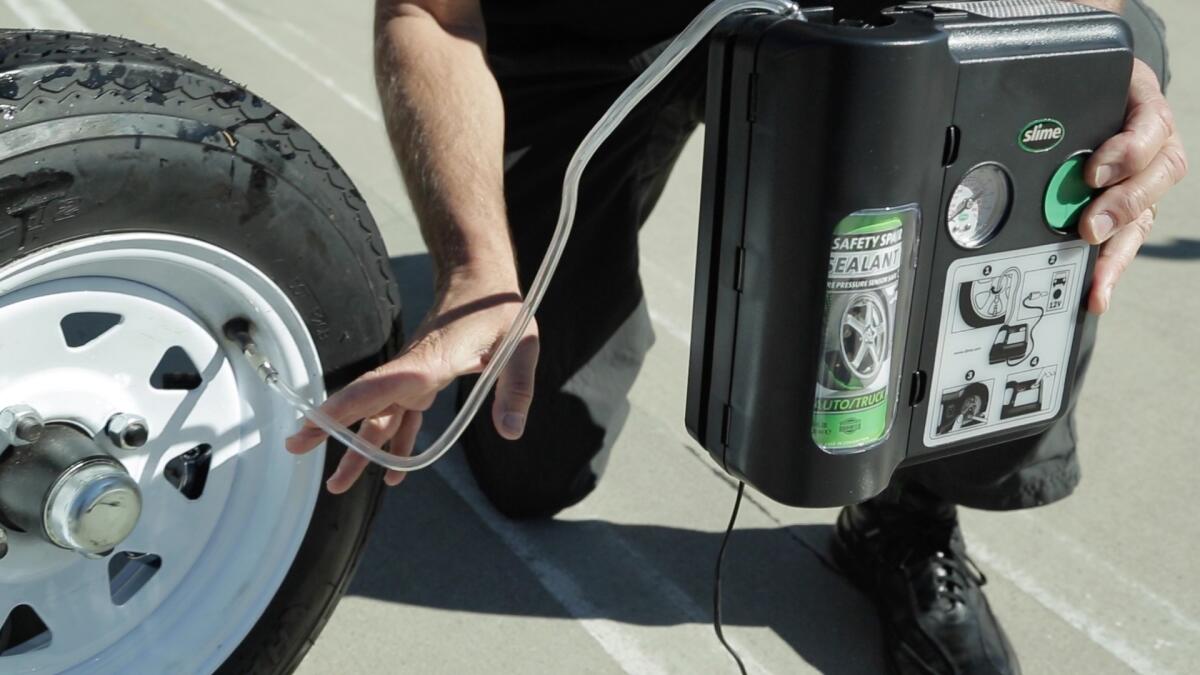To make cars lighter, automakers are dropping the spare tire

- Share via
An increasing number of new cars are sold without a full-size spare tire. A surprising number don’t even come with “run-flats” or a temporary “donut” spare tire.
It’s not that the manufacturers are cheap. Most car companies, under the gun to improve fuel economy, are removing spare tires to cut weight in the vehicle. Using a repair kit to replace a full-size spare, and the accompanying lug wrench and automobile jack required to install it, can save up to 100 pounds.
For the record:
5:48 p.m. Jan. 23, 2025A previous version of this article said Fix a Flat supplies original equipment manufacturer tire repair kits. Fix a Flat sells aftermarket tire repair kits, whereas its parent company ITW Global Tire Repair supplies OEM kits.
“Automakers are trying to eke out every single mile per gallon that they can,” said Ron Montoya, Edmunds.com’s senior consumer advice editor. “It’s also a cost issue and a question of trying to increase the trunk space.”
Live updates from the 2016 L.A. Auto Show »
That’s great business for ITW Global Tire Repair. As a supplier to Ford, GM, Chrysler, Toyota, Honda, Tesla and others, ITW’s tire repair kits are now standard on many new cars. The company is also the parent of Fix a Flat, which makes after-market tire repair kits that are sold at Walmart and major auto parts stores.
As recently as 2006, more than half of all new cars sold in America came with full-size spares in the trunk. By 2011, that had dropped to less than a third. This year, according to Edmunds.com, it’s fewer than a quarter: Only 22.9% of new cars sold in 2016 came so equipped.
The temporary spare numbers are falling too. In 2006, 50% of new cars sold came with a donut. In 2011, as full-size spares were being phased out, that number had risen to 61.7%. In 2016, it has fallen to 53%.
Those full-size spares and the donuts that replaced them are now being replaced by tire repair kits. Edmunds’ research shows 28% of all new cars sold in 2016 had that equipment, up from only 8% in 2009, the first year for which numbers are available.
Patrick B. Mallon, director of marketing and innovation for ITW Global Tire Repair, said his company’s research suggests that very few people with spare tires ever use them, even if their cars are equipped with them.
Some will use tire repair kits, but most will call for roadside assistance. (Some higher-end car companies, like Tesla, offer free roadside assistance for blown tires and other emergencies.)
And fewer than 50% of drivers are able to change a flat tire anyway, Mallon said, either because they don’t know how or they lack the physical strength to get the spare out of the trunk, loosen the lug nuts, jack up the car and remove the flat tire.
The Fix a Flat solution involves plugging an electrical connection into a 12-volt adapter, threading a hose onto the flat tire’s valve stem, and waiting seven to 10 minutes for the puncture to seal and the repaired tire to inflate.
The Fix a Flat system, like the donut, only gets you to the tire repair or replacement shop and isn’t considered a permanent fix.
Edmunds’ Montoya said most people don’t investigate the spare tire angle when they buy a new car and may be shocked to discover, standing by the side of the road with a flat tire, than there’s no spare in the trunk.
Depending on what they’re driving, they may find there’s no repair kit either.
“We have had two Teslas in our fleet — a Model S and a Model X — and they didn’t come with run-flats and they didn’t have spares and they didn’t have repair kits,” Montoya said. “So you have no choice but to call for a tow truck.”
ALSO
The disappearing stick shift: Less than 3% of cars sold in the U.S. have manual transmissions
Electric cars are less than 1% of the market. Yet automakers are pushing them big time. Why?
New hybrid and electric cars must make noise while driving slowly, new U.S. rule says




